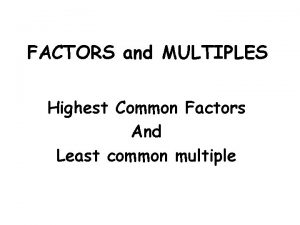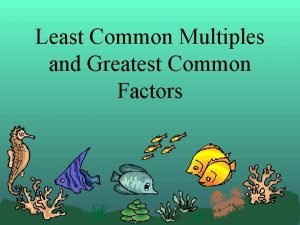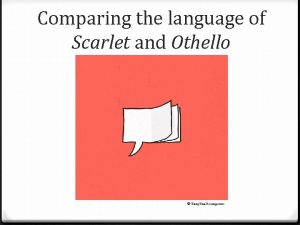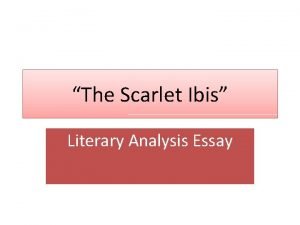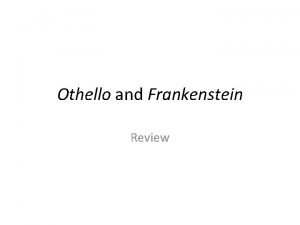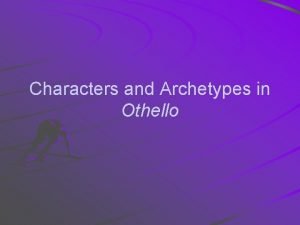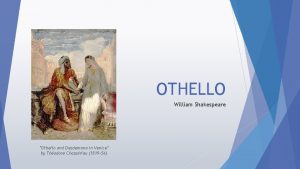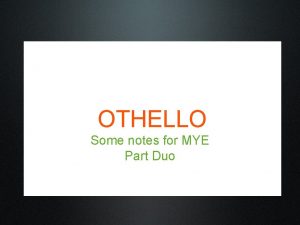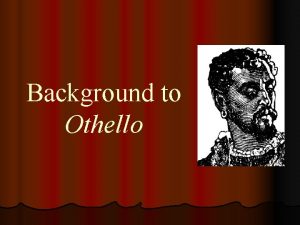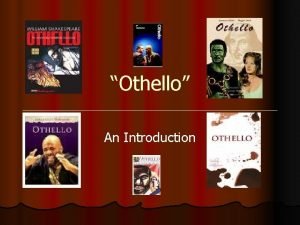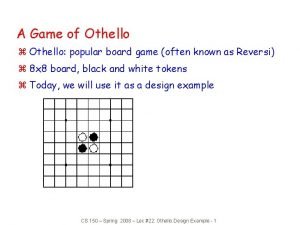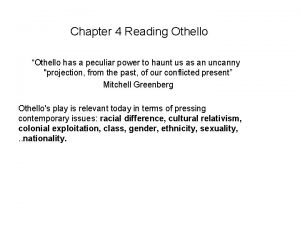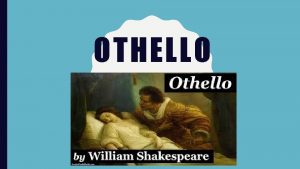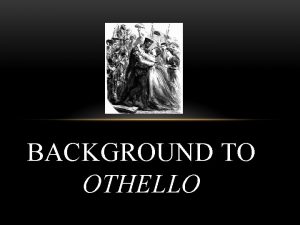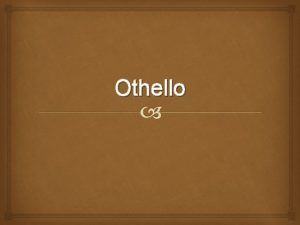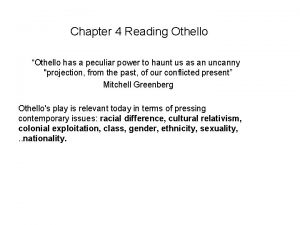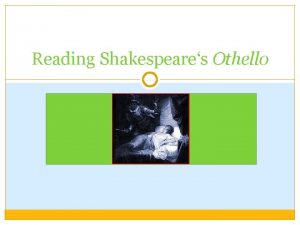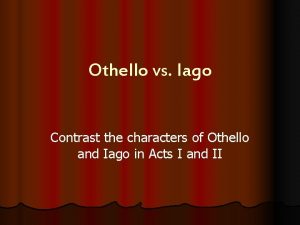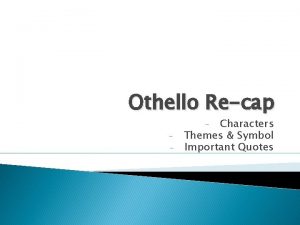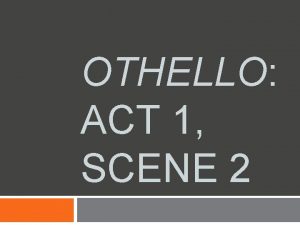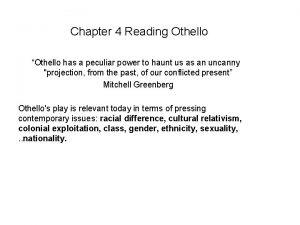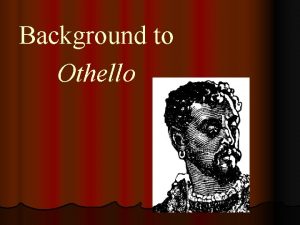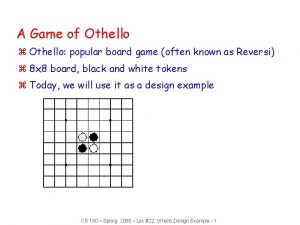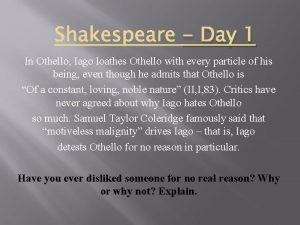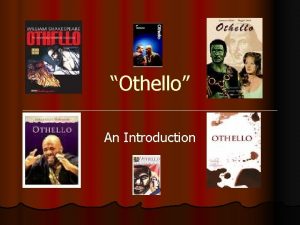Comparing the language of Scarlet and Othello Common































- Slides: 31

Comparing the language of Scarlet and Othello

Common Themes? 0 Concealment vs. Revelation 0 Appearance vs. /and Reality 0 Private Self and Public Persona 0 Vengeance 0 Alienation of Individuals 0 Manipulation and Deceit

“But if thought corrupts language, language can also corrupt thought. ” George Orwell, “Politics and the English Language” (1946)

Argument: that the manipulative relationships between characters are represented in language style, diction and ambiguity of speech, shaping audience’s/viewer’s reception of the tensions and conflicts in the texts.

Style of Speech Iago’s debasing and degrading speech infecting Othello’s speech and thus his worldview Chillingworth leeching onto the spiritual discourse of Dimmesdale to torment him

Iago infects Othello Norman Sanders contends that Iago has a “capacity … to reduce imaginatively all he contemplates” (54)

Love Lust IAGO: . . . our carnal stings, our unbitted lusts; whereof I take this, that you call love, to be a sect or scion RODERIGO: It cannot be. IAGO: It is merely a lust of the blood and a permission of the will. […] “when she is sated with his body, she will find the error of her choice. (1. 3. 330 -350)

Women Objects IAGO: Look to your house, your daughter, and your bags! Thieves, thieves! (1. 1. 80) IAGO: A thing for me? It is a common thing – EMILIA: Ha? IAGO: To have a foolish wife. (3. 3. 300 -301) Also – can you think of how “common thing” is particularly ambiguous a phrase?

Human Activity Animal Behaviour The very, very famous Tup Ewe quote – IAGO: Even now, very now, an old black ram is tupping your white ewe (1. 1. 89)

Iago’s style of speech and diction infect Othello’s own: the latter develops a higher incidence of debasing, degrading speech patterns

Othello’s Language: Initial Observations And heaven defend your good souls that you think I will your serious and great business scant For she is with me. No, when light-winged toys Of feathered Cupid seel with wanton dullness My speculative and officed instruments … (1. 3. 265 -273) Speech style: elevated, formal, poetic; note rhythm

Othello Stained That we can call these delicate creatures ours, And not their appetites. I had rather be a toad, And live upon the vapour of a dungeon (3. 3. 268 -269) Thou hadst been better have been born a dog Than answer my waked wrath. (3. 3. 360) A horned man’s a monster and a beast. (4. 1. 73)

More Proof?

IAGO, insinuating to OTHELLO that DESDEMONA has cuckolded OTHELLO with CASSIO: “Were they as prime as goats, as hot as monkeys …” (3. 3. 401) OTHELLO, to LODOVICO, after having struck DESDEMONA: “You are welcome sir, to Cyprus. – Goats and monkeys!” (4. 1. 258)

Iago’s contamination of Othello’s language evidences his grasp on the Moor’s mind, heart, and soul; language performs the spreading infection of Iago’s control.

What of Scarlet? Scarlet arguably does not present similar shifts in a character’s speech style and diction, since it presents characters engaged in the same spiritual discourse …

… but this allows Chillingworth to employ the very imagery of salvation and damnation of Dimmesdale’s speech to torment him, resulting in an outward display of guilt.

Ch. 10: The Leech and His Patient DIMMESDALE: … guilty as they may be, retaining, nevertheless, a zeal for God’s glory and man’s welfare, they shrink from displaying themselves black and filthy in the view of men; because, thenceforward, no good can be achieved by them; no evil of the past redeemed by better service. (116)

Ch. 10: The Leech and His Patient CHILLINGWORTH: Their love for man, their zeal for God’s service, -- these holy impulses may or may not coexist in their hearts with the evil inmates to which their guilt has unbarred the door … if they seek to glorify God, let them not lift heavenward their unclean hands! If they would serve their fellow-men, let them do it by making manifest the power and reality of conscience … (116)

Ch. 10: The Leech and His Patient What Dimmesdale preaches concerning others is uncannily read back against him; the “outpouring” of sins (115) he praises is precisely what he withholds from himself and conceals from Puritan society.

Argument: that the manipulative relationships between characters are represented in language style, diction and ambiguity of speech, shaping audience’s/viewer’s reception of the tensions and conflicts in the texts.

Style of Speech Iago’s debasing and degrading speech infecting Othello’s speech and thus his worldview Chillingworth leeching onto the spiritual discourse of Dimmesdale to torment him

EFFECT on Victims Shift in speech style of Othello evidences Iago’s increasingly successful manipulation of the Moor Cw’s leeching onto Dd’s spiritual discourse torments the clergyman by applying to him the very same spiritual truths he preaches

Remember this: much of what we know of characters and their relationships comes from what words are put in their mouths

Analysing their dialogue thus provides an angle into the tensions and conflicts in their relationships

What else could one notice about language in the texts?

Most obviously – different styles 0 Othello: contrast blank verse against prose, and consider their alignment with elevated discourse and base speech (cf. metaphors, imagery). 0 Scarlet: contrast direct speech against narrative interjection, noting modality (e. g. “might”, “may”, “could”) and retrospective commentary

Ambiguity and Certainty Suggestion: that Scarlet presents a declarative and imperative speech as an extension of the unyielding, dogmatic Puritan atmosphere, while conditional statements in Othello perform the grey area of ambiguity that torments its eponymous character.

Conditional IAGO: Ha! I like not that. OTHELLO: What dost thou say? IAGO: Nothing, my lord, or if– I know not what. OTHELLO: Was not that Cassio parted from my wife? IAGO: Cassio, my lord? No, sure, I cannot think it, that he would sneak away so guiltylike … (3. 3. 35 -39)

Declarative and Imperative “Woman, transgress not beyond the limits of Heaven’s mercy!” cried the Reverend Mr. Wilson […] “Speak, woman!” said another voice, coldly and sternly, proceeding from the crowd about the scaffold. ” (Ch. 3, p. 63) “Not so, my child. I shall, indeed, stand with thy mother and thee one other day, but not to-morrow!” (Ch. 12, p. 134)

 Figurative language comparing two things
Figurative language comparing two things Common factors of 12 and 24
Common factors of 12 and 24 Common anode and common cathode
Common anode and common cathode Factors of 60 and 72
Factors of 60 and 72 Highest common factors and lowest common multiples
Highest common factors and lowest common multiples Greatest common factor and least common multiple
Greatest common factor and least common multiple Highest common factors and lowest common multiples
Highest common factors and lowest common multiples Othello language style
Othello language style Metaphors in the scarlet ibis
Metaphors in the scarlet ibis The scarlet ibis analysis
The scarlet ibis analysis Comparing and contrasting hinduism and buddhism
Comparing and contrasting hinduism and buddhism Hình ảnh bộ gõ cơ thể búng tay
Hình ảnh bộ gõ cơ thể búng tay Frameset trong html5
Frameset trong html5 Bổ thể
Bổ thể Tỉ lệ cơ thể trẻ em
Tỉ lệ cơ thể trẻ em Chó sói
Chó sói Chụp tư thế worms-breton
Chụp tư thế worms-breton Alleluia hat len nguoi oi
Alleluia hat len nguoi oi Các môn thể thao bắt đầu bằng tiếng bóng
Các môn thể thao bắt đầu bằng tiếng bóng Thế nào là hệ số cao nhất
Thế nào là hệ số cao nhất Các châu lục và đại dương trên thế giới
Các châu lục và đại dương trên thế giới Cong thức tính động năng
Cong thức tính động năng Trời xanh đây là của chúng ta thể thơ
Trời xanh đây là của chúng ta thể thơ Mật thư tọa độ 5x5
Mật thư tọa độ 5x5 Phép trừ bù
Phép trừ bù Phản ứng thế ankan
Phản ứng thế ankan Các châu lục và đại dương trên thế giới
Các châu lục và đại dương trên thế giới Thơ thất ngôn tứ tuyệt đường luật
Thơ thất ngôn tứ tuyệt đường luật Quá trình desamine hóa có thể tạo ra
Quá trình desamine hóa có thể tạo ra Một số thể thơ truyền thống
Một số thể thơ truyền thống Cái miệng xinh xinh thế chỉ nói điều hay thôi
Cái miệng xinh xinh thế chỉ nói điều hay thôi Vẽ hình chiếu vuông góc của vật thể sau
Vẽ hình chiếu vuông góc của vật thể sau




